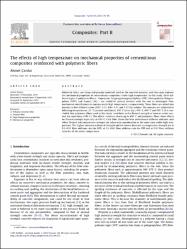The effects of high temperature on mechanical properties of cementitious composites reinforced with polymeric fibers

View/
Access
info:eu-repo/semantics/closedAccessDate
2013Access
info:eu-repo/semantics/closedAccessMetadata
Show full item recordAbstract
Polymeric fibers are cheap and popular materials used in the concrete industry, and they may improve the mechanical properties of cementitious composites under high temperature. In this study, three different types of polymeric fibers - Copolymer Polypropylene/polyethylene (CPP), Homopolymer Polypropylene (HPP), and Aramid (AR) - are added to cement mortars with the aim to investigate their mechanical contributions to mortars under high temperature, comparatively. These fibers are added into mortars in five different ratios (0.0%, 0.3%, 0.6%, 0.9% and 1.2%) by volume. The mortars are subjected to following temperatures: 21 degrees C (normal conditions), 100 degrees C (oven dry), 450 degrees C, 650 degrees C and 850 degrees C. It is concluded that polymeric fibers used in this study contribute to the flexural strength of mortars under normal dry conditions (100 degrees C). This effect continues clearly up to 450 degrees C and polymeric fibers show effects on flexural strength especially at 450 degrees C. Each fiber shows the best performance different addition ratio when flexural and compressive strength are taken into consideration at the same time under high temperature. The highest increase in flexural strength and the lowest decrease in compressive strength are at 0.3-0.9% fiber addition ratio for HPP, at 0.3-0.6% fiber addition ratio for CPP and at 0.9% fiber addition ratio for AR for every temperature. (c) 2012 Elsevier Ltd. All rights reserved.

















